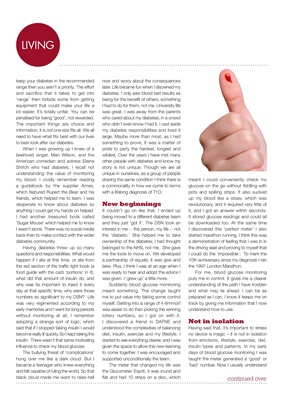
LIVINGLIVING
keep your diabetes in the recommended
range then you aren't a priority. The effort
and sacrifice that it takes to get into
'range' then forbids some from getting
equipment that could make your life a
lot easier. It's totally unfair. You can be
penalised for being 'good', not rewarded.
The important things are choice and
information; it is not one size fits all. We all
need to have what fits best with our lives
to best look after our diabetes.
When I was growing up I knew of a
bee-hived singer, Mari Wilson, and the
American comedian and actress Elaine
Stritch who had diabetes. I recall not
understanding the value of monitoring
my blood. I vividly remember reading
a guidebook by the supplier Ames,
which featured Rupert the Bear and his
friends, which helped me to learn. I was
desperate to know about diabetes so
anything I could get my hands on helped.
I had another treasured book called
'Sugar Mouse' which helped me to know
I wasn't alone. There was no social media
back then to make contact with the wider
diabetes community.
Having diabetes threw up so many
questions and responsibilities. What would
happen if I ate at this time, or ate from
the red section of the traffic light book (a
food guide with the carb 'portions' in it),
what did that amount of insulin do, and
why was its important to inject it every
day at that specific time, why were those
numbers so significant to my DSN? Life
was very regimented according to my
early memories and I went for long periods
without monitoring at all, I remember
adopting a strange sort of logic, which
said that if I stopped taking insulin I would
become really ill quickly. So I kept taking the
insulin. There wasn't that same motivating
influence to check my blood glucose.
The bullying threat of 'complications'
hung over me like a dark cloud. But I
became a teenager who knew everything
and felt capable of ruling the world. So that
black cloud made me want to raise hell
now and worry about the consequences
later. Life became fun when I disowned my
diabetes. I only saw blood test results as
being for the benefit of others, something
I had to do for them, not me. University life
was great. I was away from the parents
who cared about my diabetes, in a crowd
who didn't even know I had it. I cast aside
my diabetes responsibilities and lived it
large. Maybe more than most, as I had
something to prove, It was a matter of
pride to party the hardest, longest and
wildest. Over the years I have met many
other people with diabetes and know my
story is not unique. Though we are all
unique in ourselves, as a group of people
sharing the same condition I think there is
a commonality in how we come to terms
with a lifelong diagnosis of T1D.
New beginnings
It couldn't go on like that. I ended up
being moved to a different diabetes team
and they just 'got it'. The DSN took an
interest in me -- the person, my life -- not
the 'diabetic.' She helped me to take
ownership of the diabetes; I had thought
belonged to the NHS, not me. She gave
me the tools to move on. We developed
a partnership of equals; it was give and
take. Plus, l think I was at an age when I
was ready to hear and adopt the advice I
was given. I 'grew up' a little more.
Suddenly blood glucose monitoring
meant something. The change taught
me to put value into taking some control
myself. Getting into a range of 4-8mmol/l
was easier to do than picking the winning
lottery numbers, so I got on with it.
I discovered a friend in DAFNE and
understood the complexities of balancing
diet, insulin, exercise and my lifestyle. I
started to see everything clearer, and I was
given the space to allow this new learning
to come together. I was encouraged and
supported unconditionally the team.
The meter that changed my life was
the Glucometer Esprit, it was round and
flat and had 10 strips on a disc, which continued over
meant I could conveniently check my
glucose on the go without fiddling with
pots and spilling strips. It also sucked
up my blood like a straw, which was
revolutionary, and it required very little of
it, and I got an answer within seconds.
It stored glucose readings and could all
be downloaded too. At the same time
I discovered this 'perfect meter' I also
started marathon running. I think this was
a demonstration of feeling that I was in in
the driving seat and proving to myself that
I could do the 'impossible'. To mark the
10th anniversary since my diagnosis I ran
the 1997 London Marathon.
For me, blood glucose monitoring
puts me in control. It gives me a clearer
understanding of the path I have trodden
and what may lie ahead. I can be as
prepared as I can. I know it keeps me on
track by giving me information that I now
understand how to use.
Not in isolation
Having said that, it's important to stress
no device is magic - it is not in isolation
from emotions, lifestyle, exercise, diet,
insulin types and patterns. In my early
days of blood glucose monitoring I was
taught the meter generated a 'good' or
'bad' number. Now I usually understand